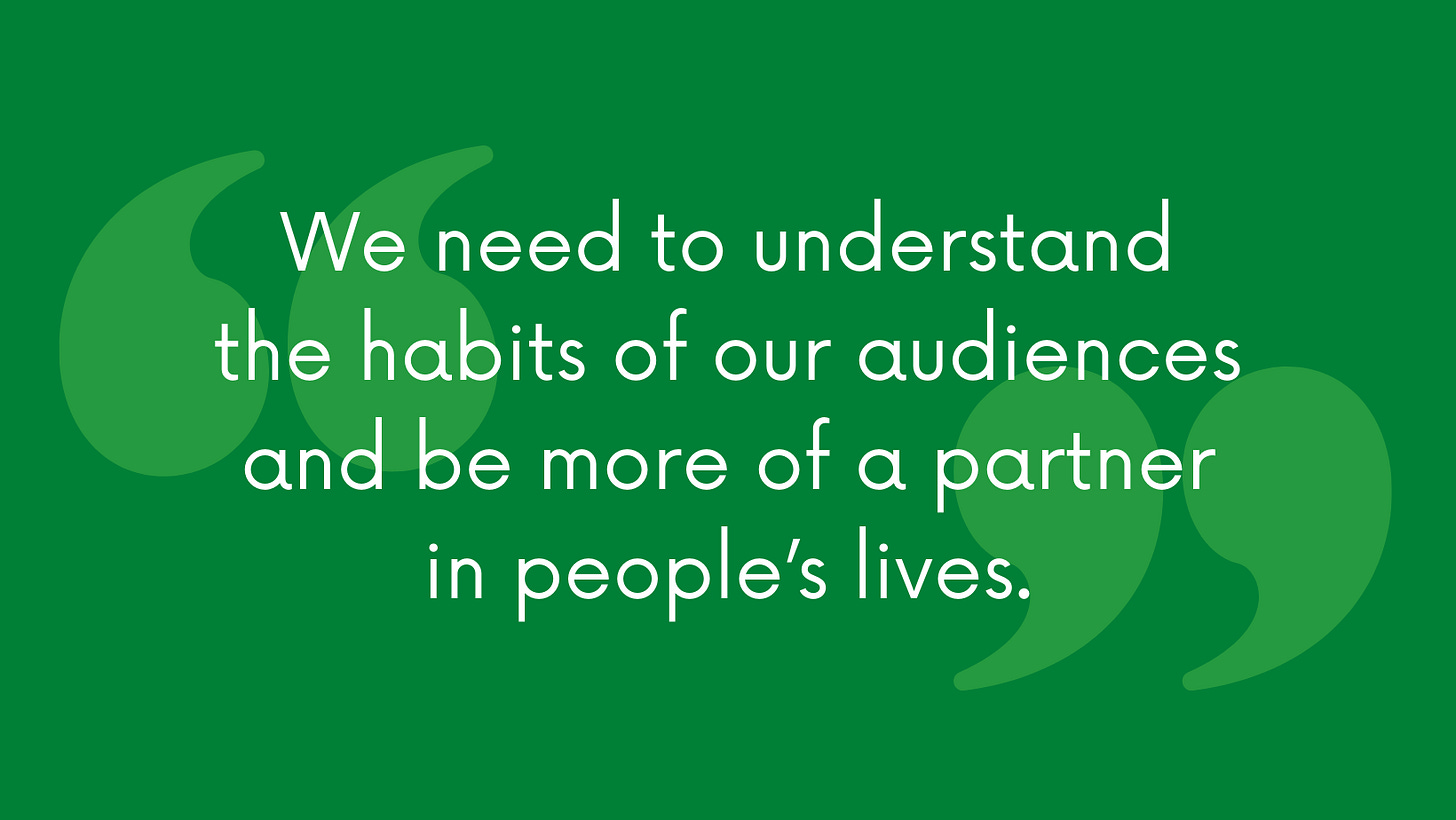Erika Aguilar on the future and NPR
The new leader of Morning Edition and Up First emphasizes teamwork, representation, new audiences and change. 📈
Erika A. Aguilar is NPR’s new Executive Producer for Morning Edition and Up First. Her ascendance as one of public media’s most prominent Latinas is significant.
A veteran of Austin’s KUT and California’s KPCC, Aguilar is widely regarded as one of the system’s most outstanding talents. Today (Oct. 29), she wraps up her tenure at KQED as director of podcasts. That period saw award-winning audio covering California news, arts and culture. Starting Nov. 8, Aguilar heads up noncommercial radio’s iconic program as well as NPR’s breakthrough podcast.
In this conversation with Erika Aguilar, we discuss her new position and where public media is headed. 👇🏽
How does it feel to be a Latina leading NPR’s biggest program?
It's one of my proudest achievements. To have the opportunity to be with this team and to have the trust of NPR, and to set an example for other Latine people to say ‘you can do whatever you want. You can do the things that you want. And if you want to be here, you can do that, too.’ That's a big part of the reason why I wanted to set that example. That if you want my job, you can have it.
Just stay in it for a little bit first!
Yeah, let me try it out real quick! I'm not sure that I ever thought that it was possible. But the people in NPR have been amazing to me the last few months. My new boss said, ‘we think you're the future of NPR.’ I don't know if anybody's ever told me that. And to hear that support, that somebody believes, is motivating. That was a moment. I don't know if I ever believed that I was going to hear that. I was blown away, and grateful and proud and sold.
I will say, as a woman of color in leadership, everybody's got expectations of you. Then you've got expectations for yourself. I place them on myself as a woman of color, a Latina, in taking on this gem of a show, and knowing that people have expectations to make some change for the better. That makes me nervous, but I'm so proud to get a shot at doing it.
What excites you about this role?
The appetite for change. I heard from producers, hosts, desk editors, managing editors from the newsroom, and even our VPs at NPR. They are eager for change. They are looking to grow with the listeners and to invite the next generation of NPR listeners to Morning Edition. The big challenge is going to be thinking about where Morning Edition goes as a show, In five years and 10 years. What do we do so well that our audience comes back to rely on every day? And how do we continue to do that, and grow at the same time?
Who is our next audience?
Our next generation of listeners for Morning Edition are a bit younger. They are diverse in terms of ethnicity and race. We need to also know they are people who immigrated and made America their home. It’s first-, second-, third-generation people who have identities in other parts of the world. I'm going to try my hardest to welcome them. I'm going to do what I can. We are a much more diverse place. All our children are going to be incredibly diverse people for generations. We cannot move without them, or we will become irrelevant.
What are you expecting your day to day to be?
I expect for the first few months I'm going to immerse myself in understanding the show. I want to spend time sitting side by side with producers. There is incredible teamwork that happens. Once I have my arms around the show, we're going to figure out where we're going in the future and what our vision is. And that has a lot to do with understanding our current audiences, and then the audiences we aspire for.
What do you want to take on first?
Oh, man, thanks for asking this. I'm a diehard team worker. I love being a producer because it allows me to oscillate among the different jobs. That producer role demands that producers are also teammates. So, my first thing is going to be getting to know my team. I want to know what motivates them. I want to know where they're going. I want to know where they want to go with this show. I want to know what they want to change about the show. I can't wait to strategize and really lead with the team managers. The next thing to do is to understand our audiences and start figuring out how we are going to welcome our new audiences.
To what you said about what the team wants: what do you want for Morning Edition and Up First?
So, I didn't grow up listening to NPR. But I've worked with many people who grew up listening to NPR. And they always say, ‘oh, yeah, I was the kid in the back seat listening,’ right? I want more backseat listeners. But I also want backseat listeners to become listeners today. I don't want them to say, ‘I remember when I used to listen.’ I want them to know the brand from when they were backseat listeners, and to stay with the brand all the way until they're living their best lives and into the sunset.
Why do you think that connection gets lost?
Sometimes we forget, when we become adults, that not everyone has experienced the same events we have. They need context to understand the current situation. It's hard to keep up. Sometimes just a quick history lesson will do. You're not invited to the conversation when you don't have the context. But to invite people to the conversation, you can’t take the backstory for granted.
How are you feeling about NPR as far as representation goes right now?
I’ve seen the staff and source diversity numbers, and I commend NPR for doing the work and posting it publicly. We’re not where we could be. But I am looking forward to being part of those efforts toward more staff and source diversity. I understand NPR wants to do things differently. How that manifests is unknown just yet.
Where is public media going in your view?
We’re headed to a place of increasing diversity – not just race and gender, but also class and geography. More leaders are seeing that. I also believe we face a technological challenge. Radio is here and will never go away. However, we need to understand the habits of our audiences and be more of a partner in people’s lives. 🟣
La próxima ⌛
Last newsletter, I promised a dive into the latest Latino/a/e/x demographic data. It got bumped a little for this conversation with Erika Aguilar. News of her move to NPR broke before the first OIGO came out.
The next OIGO lands November 12, around Latin Grammys time. 🎹 Claudio Cabrera of the New York Times join us. He’ll share how the Times is covering the event in English and Spanish. Not as translations, but standalone content independent of the other language. There are many potential lessons for public media.
❓❓❓ Have someone you know who deserves some shine? Are you doing work you want to share? Leave a comment or hit Reply.
Muchisimas gracias 😻
OIGO started two weeks ago. Now, there are 221 subscribers. Thanks for signing up. Also, thank you for sharing with your networks, and for talking about OIGO on social media and Slack. Together we are shifting the narrative. ¡Dale! 🙌🏽
Cafecito: stories to discuss ☕
Amazon is working on a platform to let users be DJs, according to the Verge. Amazon Music, Twitch, Alexa and other properties are in the mix to build this experience. Latin radio, which often underserves Central and South American nationalities’ culture and music, is on notice. So is community media, whose whole brand is about volunteer producers and agency.
Revista Étnica and others are talking about Blackness in Puerto Rico. This coalition is teaching people how to fill out Census forms. It has also called out commercial media for exclusion. Refinery29 offers a look at the movement. ✊🏿
Even if you’re in noncommercial media, the name Radio Maria may not be familiar to you. The Catholic radio network has operations worldwide. 12 of its 77 stations are in America. Radio Maria has adopted a diverse broadcast strategy. It's utilizing alternate bands, HD Radio and now DTS AutoStage to reach listeners. 📻 The last one, by Xperi, is new. It combines terrestrial and content delivered over IP. Radio World has more. The tech may have limited appeal, but credit Radio Maria for thinking outside the box.
I mentioned the Alt.Latino team last newsletter. This conversation with Felix Contreras is a lively look at how the Tiny Desk takeover came together. Latin America, Contreras says, comprises a strong following for the NPR series.
El radar: try this 📡
Cover environmental racism anew. In Chicago, dumps moving to the Latino/a/e/x Southeast Side community sparked a movement. The Washington Post covers the issue. It is a familiar story: economic development highlights economic disparity. How much is public media addressing such inequities in our own backyards? BTW, Pew Research this month notes how important the environment and climate change are to Hispanics.
Hear needs of staff of color. Carla Murphy is leading an important journalists of color survey. The research aims to track the values and vision of current BIPOC journalists. The deadline is Oct. 30. 🗒️
Diversify your network. Want to connect with audiences? INN’s Bridget Thoreson authored an exercise for engagement at OpenNews’ Source blog. It is a mix of mind mapping and fostering source diversity. Well worth acting on at your organization.
Consider sports and inclusion. Athletics are not just entertainment. For some, sports offer a better life. Note KQED’s Rightnowish, where a boxer turned being teased at school into Olympic dreams. And then there’s pro hockey player Al Montoya. He’s made Latino/a/e/x recruitment to the sport his mission. I wonder how many similar stories are in your community.
Manifesting 🔮
…credit where due. 🧡 I shouted out Doug Mitchell at our kickoff, but I have two people to publicly thank for OIGO’s start. The Corporation for Public Broadcasting's Jacquie Gales Webb is a friend and inspiration. She's one of the only top people in public media asking questions about Latino/a/e/x audiences. We've talked about this subject for a couple of years. OIGO is an outcome. Also, Corey Ford, leader of the Sulzberger Executive Leadership Program, has been essential. My fellowship gave OIGO its foundation. BTW, Sulzberger is accepting applications for its four scholarships until Nov. 1.
…a correction. ✏️ Last newsletter, I mentioned El Timpano. In fact, the figure I stated is revenue from partnerships. It's not the sole source, but it’s key. Also, congrats to the team for winning an Online Journalism Award!
…500 people by December. Can we? 🙏🏽 I want to see if we can expand our circle. Please share this newsletter and tell others. Thanks for reading!
— Ernesto







